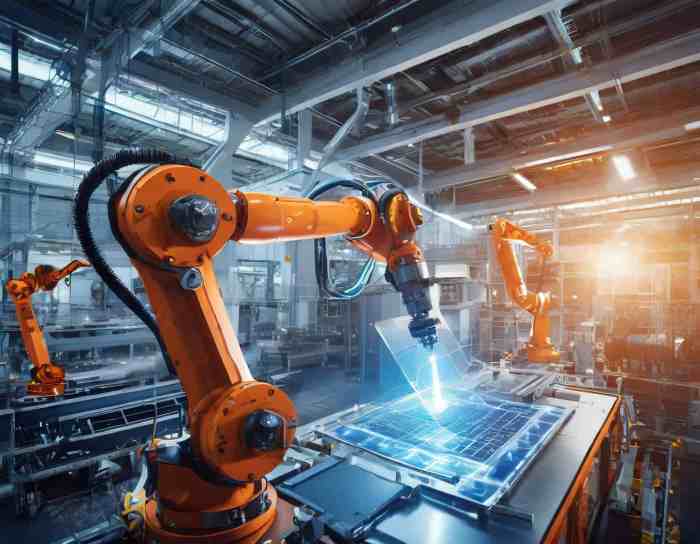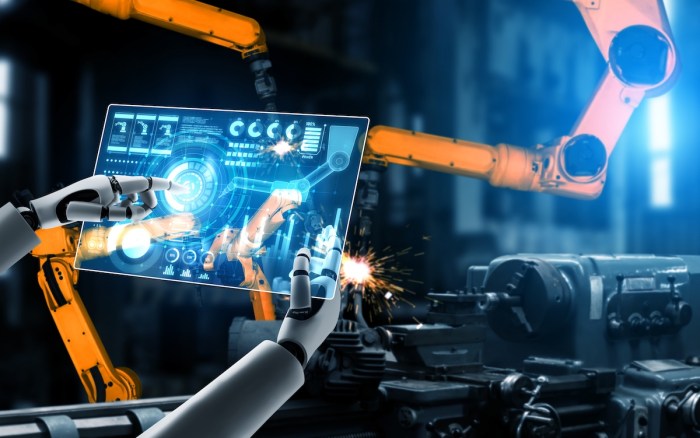
In the realm of manufacturing, the integration of AI to enhance operational efficiency and productivity has become increasingly prevalent. This article delves into the pivotal role that AI plays in shaping smarter manufacturing systems, offering a blend of insightful analysis and practical examples to illuminate this transformative trend.
As we navigate through the intricate landscape of AI in manufacturing, we uncover the myriad ways in which this technology is reshaping traditional processes and paving the way for a more streamlined and intelligent manufacturing ecosystem.
Overview of AI in Manufacturing
AI, or Artificial Intelligence, in the context of manufacturing refers to the use of advanced algorithms and machine learning techniques to automate and optimize various processes within the manufacturing industry. AI is revolutionizing the manufacturing industry by enabling predictive maintenance, improving quality control, optimizing production schedules, and enhancing overall efficiency.
By analyzing large amounts of data in real-time, AI systems can make accurate decisions faster than human operators, leading to increased productivity and cost savings.
Examples of AI Applications in Manufacturing
- Predictive Maintenance: AI algorithms can analyze equipment sensor data to predict when machines are likely to fail, allowing for proactive maintenance and reducing downtime.
- Quality Control: AI-powered systems can inspect products on the assembly line for defects or inconsistencies, ensuring high-quality standards are met.
- Production Optimization: AI can optimize production schedules based on demand forecasts, inventory levels, and other factors to maximize efficiency and minimize waste.
- Supply Chain Management: AI helps in streamlining supply chain operations by predicting demand, optimizing inventory levels, and improving logistics planning.
Benefits of AI in Developing Smarter Manufacturing Systems
AI has revolutionized the manufacturing industry by providing numerous advantages that enhance efficiency, productivity, and maintenance processes.
Improved Efficiency and Productivity
- AI algorithms can analyze vast amounts of data in real-time, optimizing production processes and reducing waste.
- Machine learning models can predict equipment failures before they occur, allowing for preemptive maintenance and minimizing downtime.
- Automation of repetitive tasks through AI-powered robotics increases operational speed and accuracy.
Predictive Maintenance and Reduced Downtime
- AI systems can monitor equipment performance and detect anomalies, enabling proactive maintenance to prevent breakdowns.
- By implementing AI-driven predictive maintenance strategies, manufacturers can significantly reduce unplanned downtime and associated costs.
- Continuous data analysis allows for real-time adjustments and optimization of production schedules, ensuring seamless operations.
AI Technologies Driving Smarter Manufacturing
Artificial Intelligence (AI) technologies play a crucial role in developing smarter manufacturing systems. These technologies encompass a wide range of tools and techniques that revolutionize the manufacturing industry, leading to increased efficiency, quality, and productivity.
Machine Learning and Deep Learning in Manufacturing Applications
Machine learning and deep learning are two prominent AI technologies used in manufacturing applications.
- Machine learning involves algorithms that enable machines to learn from data and make predictions or decisions without being explicitly programmed. In manufacturing, machine learning is utilized for predictive maintenance, quality control, and demand forecasting.
- Deep learning, a subset of machine learning, uses artificial neural networks to analyze complex patterns and structures in data. In manufacturing, deep learning is employed in image and speech recognition, anomaly detection, and process optimization.
Role of Robotics and Automation in AI-driven Manufacturing Processes
Robotics and automation are integral components of AI-driven manufacturing processes, enhancing efficiency and precision across various operations.
- Robotics involves the use of robots to perform tasks traditionally carried out by humans, such as assembly, welding, and material handling. These robots are equipped with AI algorithms that enable them to adapt to changing conditions and optimize performance.
- Automation, on the other hand, involves the use of control systems and software to automate manufacturing processes, reducing human intervention and minimizing errors. AI technologies enhance automation by enabling predictive maintenance, real-time monitoring, and adaptive control.
Challenges and Limitations of Implementing AI in Manufacturing

Implementing AI in manufacturing comes with its own set of challenges and limitations that need to be carefully considered in order to ensure successful integration and operation within the industry.
1. Data Quality and Availability
One of the major challenges in implementing AI in manufacturing is the quality and availability of data. AI systems rely on large amounts of data to make accurate predictions and decisions. However, manufacturing data is often fragmented, incomplete, or of poor quality, making it difficult for AI algorithms to operate effectively.
2. Cost of Implementation
Another challenge is the cost of implementing AI technologies in manufacturing processes. Developing and deploying AI systems can be expensive, especially for small and medium-sized manufacturers with limited resources. The initial investment required for AI implementation can be a barrier for many companies.
3. Workforce Skills and Training
Integrating AI into manufacturing systems also requires a skilled workforce capable of developing, operating, and maintaining AI technologies. Many manufacturers may not have the necessary expertise in-house and may need to invest in training and upskilling their employees to work effectively with AI systems.
4. Ethical Considerations
As AI technologies become more prevalent in manufacturing, ethical considerations and concerns also arise. Issues such as data privacy, algorithm bias, and job displacement need to be addressed to ensure that AI is implemented in a responsible and ethical manner within the industry.
Case Studies
In this section, we will explore examples of companies that have successfully integrated AI in their manufacturing processes and analyze the impact of AI on cost savings, quality improvement, and innovation in manufacturing.
Company A: Automotive Manufacturing
- Company A implemented AI algorithms to optimize production schedules based on real-time data analysis.
- AI helped Company A reduce downtime by 15% and increase overall equipment effectiveness (OEE) by 20%.
- Cost savings were significant, with a 10% reduction in operational costs due to improved efficiency.
Company B: Electronics Manufacturing
- Company B utilized AI-powered predictive maintenance to identify equipment failures before they occurred.
- Quality improved by 25% as defective products were minimized through early detection and intervention.
- AI implementation led to a 30% reduction in maintenance costs and a 20% increase in production output.
Lessons Learned and Best Practices
- Invest in AI technologies that align with specific manufacturing goals and challenges.
- Ensure proper training and upskilling of employees to maximize the benefits of AI integration.
- Regularly evaluate and iterate on AI systems to adapt to changing manufacturing needs and advancements in technology.
Last Recap

In conclusion, the intersection of AI and manufacturing heralds a new era of innovation and optimization. By harnessing the power of AI-driven solutions, industries can unlock unprecedented potential and drive forward into a future defined by smarter, more efficient manufacturing systems.
Questions and Answers
How does AI improve efficiency in manufacturing?
AI enhances efficiency by optimizing production processes, predicting maintenance needs, and minimizing downtime through proactive measures.
What are the key challenges faced when implementing AI in manufacturing?
Challenges include data security concerns, high initial investment costs, and the need for upskilling the workforce to adapt to AI technologies.
Can AI technologies in manufacturing lead to job displacement?
While AI may automate certain tasks, it can also create new job roles focused on managing and optimizing AI systems, leading to a shift in job requirements rather than outright displacement.
How can AI contribute to predictive maintenance in manufacturing systems?
AI can analyze vast amounts of data to predict equipment failures before they occur, enabling proactive maintenance strategies that reduce downtime and enhance operational efficiency.













